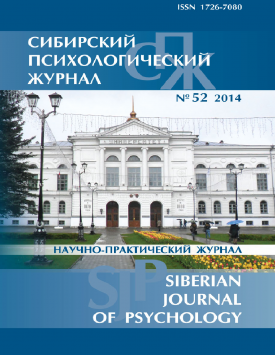The role of intellectual and personal factors in achieving high performance in the USE in mathematics
The results of the empirical study of the correlation between social intelligence and abstract-logical intelligence and their role in the achieving the academic success are presented. The Evaluation of Choice in Conflict Situations Questionnaire by S.V. Shcherbakov, the Raven's Progressive Matrices test in the modification and the adaptation by B. Koychu, and the participants' scores in the pre-testing and the final Unified state examination in mathematics were used in the study. The sample consisted of 1713 first- and second-year university students of the Tomsk State University. It is shown that in individual groups of respondents there is a correlation between social intelligence and abstract-logical intelligence, as well as there is a correlation between these types of intelligence and the academic success. The type of these correlations may vary depending on the level of social intelligence. Respondents with the high social intelligence have high abstract-logical intelligence and high academic success. These correlations have a polar nature and make a different contribution to the academic success in the groups of respondents with low and average social intelligence. High abstract-logical intelligence is associated with high social intelligence in the groups of respondents with low social intelligence. High abstract-logical intelligence is associated with high academic success in the groups of respondents with low and average social intelligence. High abstract-logical intelligence and high academic success are associated with low social intelligence in the groups of respondents with low social intelligence. The prevalence of the social intelligence over the abstract-logical intelligence is associated with low academic success in the groups of respondents with average social intelligence. Regularities which are common for individual groups of respondents are lost in the total study sample. The presence or the absence of the correlation between social intelligence and abstract-logical intelligence can be defined by the specificity of the sample and conditions of the study of this correlation.
Keywords
абстрактно-логический интеллект, социальный интеллект, академическая успешность, единый государственный экзамен (ЕГЭ) по математике, abstract-logical intelligence, social intelligence, academic success, Unified state examination (USE) in mathematicsAuthors
| Name | Organization | |
| Matsuta Valeria V. | Tomsk State University | matsuta-vv@mail.ru |
| Bogomaz Sergey A. | Tomsk State University | bogomazsa@mail.ru |
| Sudneva Olesya Yu. | Tomsk State University | avendus@mail.ru |
References

The role of intellectual and personal factors in achieving high performance in the USE in mathematics | Sibirskiy Psikhologicheskiy Zhurnal – Siberian Journal of Psychology. 2014. № 52.
